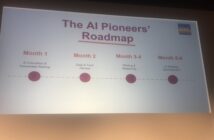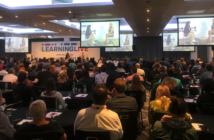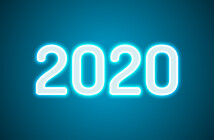Live blog notes from Stowe Boyd‘s session at the Meaning Conference.
Boyd shares his ideas on the social workplace.
Model of social biz is out of date
So we have to imagine the postnormal business. We have to imagine a future where the way we work and play will fundamentally change. There is an urgency and a promise in our time. We have to move beyond current timid thinking on social business.
Talking of the future is difficult because we cannot see it. We are always one step behind in our view of the world. The world is changing from solid to liquid. Pace of change has increased exponentially. Greatest change in the last five years.
Good and bad comes from this change – social tech powering Arab Spring versus declining investigative journalism, for example. And relationship between employees and employers is changing.
Why social business and why now?
New tools and tech have come in to workplace and infected it. But we also look at macroeconomics. The big picture drivers are important. Social business is post-modern. The post industrial era. Shift to services and knowledge work. Fall of colonialism, growing civil rights. But also incresead debt, inequalities, decline in well-being.
Social business has risen as a tool set to adapt to new tools and tech. Need more radical shifts in the workplace but social media can be a platform to that.
Volatility, uncertainty, complexity and ambiguity (VUCA) – this is our world. Global warming and migration (50% of world population is urban) are having a huge impact. Increase in density in cities provide huge potential.
VUCA undoes the idea of leadership as we know it.
Modern business is based on functions and reporting mechanisms that are hard wired into business. Social media innovation infected the org, via marketing for example. Comapnies are being changed internally. But they are still the old companies with the old hierachies.
Increasing connections and social density within a business equals happier workforce. They start to create meaning through connections. This is probably the primary driver for adoption of these tools. [Social density a key concept].
What’s coming could be very exciting. More relaxed, porous structures with greater connections. Partner companies deliver services for the company, members of the company ‘community’ now work in the company for example. More connections, more social density.
The ‘work everywhere movement’ is growing in importance. Citrix survey says business are planning 6 to 7 seven seats for every 10 employees.
Swift trust
Teams coming together in short-term basis. We have an innate bias to co-operation – why film crews come together in the way they do. Come together, want to work together and get on with the project quickly. Business now picking up on this freelance approach.
Freelance equals agility, experiments. Downside is weakening of commitment to full time workers, unpensioned workforce. Balance the two and it gets interesting.
Fast and loose
This way of working is not supported by the tools. Each project has new sets of tools – lack of interoperability. So difficult to work in this freelance way for bigger orgs and across orgs.
Postnormal democracy
Markus Schulze model. We need a model for participatory democracy – something we will need for orgs and political spehere to conect people with what is going on.
Postnormal ethos
Respect of others before self. (Levi-Strauss) All elements are connected – family, orgs, media, environment, spirituality, governement, economics, point of view, belonging.
Postnormal future
Kenneth Boulding 1966 – we are all in it together and we have to come together to work out our next steps.
Today’s tools will not take us to where we need to go but they present a path into a future which has human well-being at its core.




